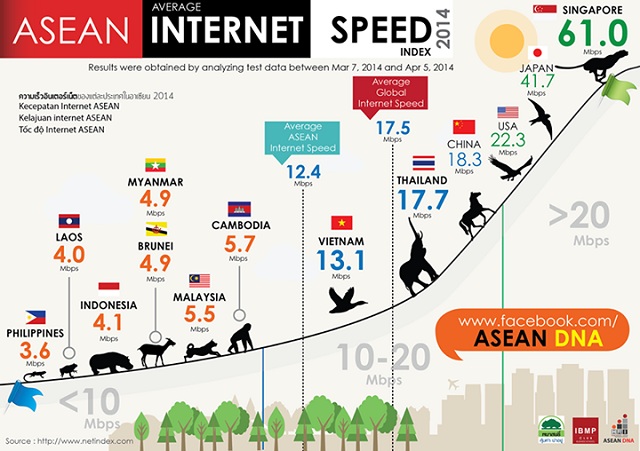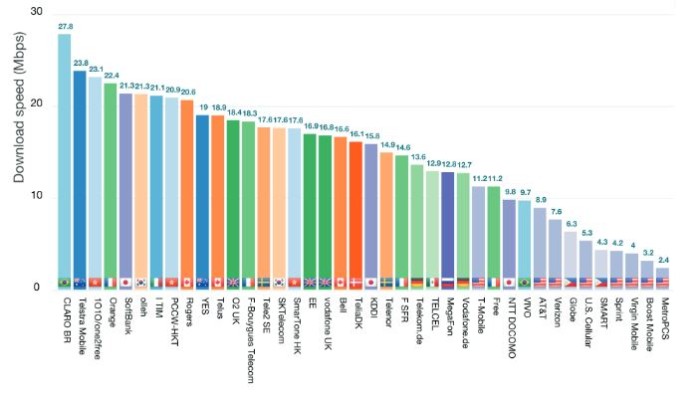AGSB Clark August 7, 2015

Daig pa tayo ng Myanmar, Cambodia, at Vietnam, quo vaids Globe, SMART?

Mukhang kulelat SMART; Does NTC, or does top management have cap ex on speeding up their internet service?
Buti nadaig natin ang Afghanistan, may giyera duon ah, eh dito,
From Inquirer/tech
One of the call to arms speeches came from an executive of a supplier in telco. He decried the very slow speed, (the slowest and the most expensive) internet connection in the Philippines. While the telcos are raking in billions in revenues and net income, they have not made investment to speed up internet in the Philippines and lower costs. All are disciples of profit, without regards to service. And maybe, NTC is turning blind eye to this predicament.
"In the latest household download index by Internet broadband testing company Ookla, the Philippines ranked 176th out of 202 countries with an average download speed of 3.64 megabit per second (mbps), way below the average broadband speed of 23.3 mbps. This was the second slowest in Asia, next to cellar-dweller Afghanistan with 2.52 mbps." - from Inquirer

Despite being one of the slowest, Internet in the Philippines also emerged as one of the most expensive (61st), with an average value of $18.19 per mbps, exceeding the average global cost of $5.21. The country also ranked 59th in the relative cost of broadband subscription, which was set at $31.55.
Thus the speaker, who prefers anonymity says we should encourage competition. Google is going to make investment in satellites that can provide such cheap and fast services. Or maybe we can put up new service providers (but the telcos all ready bought the frequency allocations) Hi di ba monopoly yan discouraging free market and competition.
But definitely you and I agree and we call on Globe and SMART The Ayala guys and MVP to address this problem. With billions at your disposal use this to improve ;your core business, rather than paying attention to basketball etc.. new acquisitions... It is a duty and business responsibility.
Leaders ano gagawin natin, magcampaign tayo....? Ano bright ideas? Or we just watch things happen?
I understand MVP is a kabalen, eh baka mabulungan natin na ayusin ang problemang ito..
Huwag tayong malungkot though, USA has second slowest LTE ahead of Phil
Finally may hearing yata this week as per Sen Bam Aquino
Sen Chiz also wants to probe slow internet in the Phil (this slows down BPO growth)
Naibulong na kahapon August 9, 2015 kay Sen Bam Aquino ang CTA ni Leader Cezar Cortez
Mag karesulta sana
Why is internet slow in the Philippines?
According to MVP at the ASEAN meeting in Clark, it is because Phil is an archipelago and this requires many cell sites and is threfore expensive. (Technical experts tama ba ito?)
1. Lengthy and prohibitive cost of putting up cell site (from Rappler)
2. Monopolistic activity of telco; PLDT as the big company controls the internet traffic. (From Philippines/reddit
PLDT does not route its traffic via IX (PACNET). It thinks it is the backbone, nor does it want to share traffic with other carriers. (So do you believe MVP or # 1 and 2 as reasoned by telcos:
Here is a portion of the article:
First Problem: PLDT Doesn’t Want To Share Its Traffic Through Peers Via Unified IX
This kind of behavior reminds of our first group work. How can some big companies lie?


I agree Prof. Communication industry has always been monopolized in the Philippines. It is a good thing though that there are now a number of major/big players. Unfortunately, though, when competitors multiply, the major players acquire their competitors, thereby we return to the same problem-monopoly! Talaga po atang ganito ang buhay sa Pilipinas Prof. Hope MVP will do something about this problem. Good luck to us.
ReplyDeleteLeader Cora and I made a presentation on cashless society in our Ecoman class. One of the important infrastructure in order to go cashless is fast internet speed. Internet speed has lots of implications, so there is a need to act on it. Let's make it happen.
ReplyDeletei really hope we can do something about this especially if it means forwarding our economy
ReplyDeleteYes Steph, you are right, Internet speed problem is an impediment to move ahead and be in the same direction as the other ( progressive) countries.
ReplyDeleteOne of my greatest fears when authorizing disbursements worth more than 1M through E-BIR is to get disconnected while in process. I was a bit frustrated during the training when it took several hours for the trainers to finish a single transaction...all because of poor connection.
ReplyDeleteDuring the E-BIR filing before April 15, 2015, I was so frustrated with poor internet connection that I wrote BIR about several attempts to comply on line but in vain.
I hope that something could be done about this.